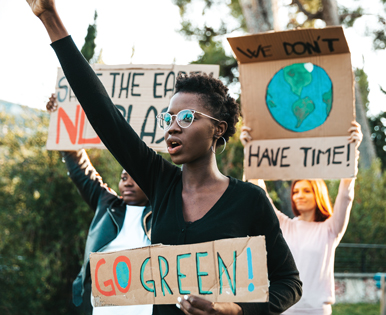
For decades, sociologist Dana Fisher attended some of the biggest rounds of climate negotiations—including those held in The Hague, Bonn, and Copenhagen—as governments laid out their ambitious goals for cutting carbon emissions. Now, she’s feeling jaded.
“For a long time, there was this hope that once everyone recognizes there is a problem with climate change, there will be effective policies to address it,” says the School of International Service professor. “But it’s absolutely not true. The government is not going to save us.”
In her newest book, Saving Ourselves: From Climate Shocks to Climate Action, Fisher argues that severe climatic disasters—which she dubs “climate shocks”—are the only thing that will spur the kind of mass activism and grassroots mobilization that can lead to effective policies.
“There is growing resistance to the notion that incremental political change can get us where we need to go,” she writes. “More and more evidence points to the fact that the only way forward involves extensive systemic change.”
Fisher’s ideas originated with her AnthroShift theory, published in 2019 with Andrew Jorgenson, which describes how large risks to society alter people’s behavior. The COVID-19 pandemic, she says, is one example of an AnthroShift; the threats posed by the virus were great enough to cause sweeping changes in how people worked, shopped, socialized, and traveled. But so far, the consequences of climate change—including wildfires, droughts, floods, rising sea levels and more severe storms than in the past—have not been life-changing enough to spark protest or change.
“Without a sustained shock that has tangible consequences in terms of social cost to people and property, the subsequent social change will be ephemeral,” Fisher says.
So, should everyone just throw up their hands and brace for disaster? On the contrary, says Fisher. She believes that climate activists can learn from the civil rights and women’s movements of the past. Rather than encouraging people only to take individual actions like giving up meat, driving electric cars, and installing solar panels on their homes (all things that Fisher admittedly has done herself), she says they can make a bigger impact by joining the climate movement and becoming involved in their communities—voting, volunteering, and lobbying for equity and social support.
“Climate shocks are coming,” Fisher says. “We need to cultivate social resilience so that when these disasters happen, our communities have more social capital, support, and resources.”
She recommends leaders of the climate movement partner with other—often more socioeconomically and racially diverse—causes such as the labor movement, which already has close ties with community activists. She also expects the climate movement to eventually capitalize on “moral shocks,” including aggression and violence against peaceful protesters. These kinds of actions can draw attention to otherwise downplayed issues, as illustrated by the Black Lives Matter protests sparked by police violence.
At AU, Fisher serves as director of the Center for Environment, Community, and Equity (CECE), a network of researchers from across campus. The center boasts an incubator program that supports faculty research projects at the intersection of society, policymaking, and the environment. One newly funded initiative, for example, is collecting data on how Black Washingtonians talk and think about climate change, to ultimately shape how information is shared with people of different demographics.
CECE’s efforts echo many of the messages in Saving Ourselves: strong, diverse, and informed communities will be the ones that ultimately stand up to climate change.